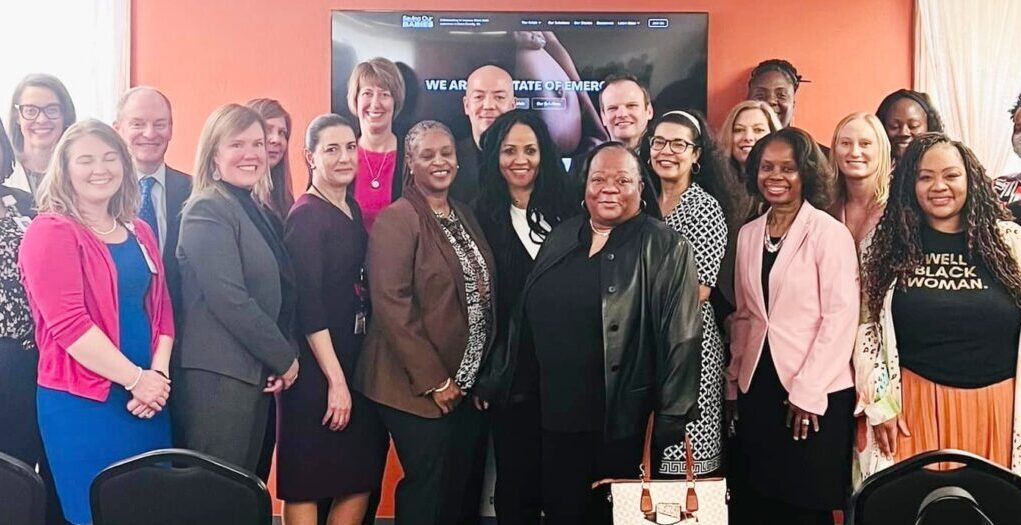Last April, ConnectRX was launched through a collaboration between The Foundation For Black Women’s Wellness (FFBWW) and Equity By Design, along with program partners on the Dane County Health Council (DCHC). ConnectRX is a referral-based program that provides wraparound care and resources for those who are screened positive for one or more of the five “Social Determinants of Health” in housing, financial strain, food insecurity, transportation needs, or stress.
The anniversary was celebrated on May 2 at the Foundation For Black Women’s Wellness headquarters on Madison’s west side where various representatives from the program partners spoke to the amazing results so far.
“Our partnership is a shining example of what can happen when systems listen to Black women and our communities, and invest in our work and our leadership,” said Lisa Peyton-Caire, CEO and president of The Foundation for Black Women’s Wellness. “Join forces with us and invite them to join forces in their work. Not only as the most impacted, but as experts in creating viable solutions that generate new possibilities and powerful change. This is what brings us here today.”
The Saving Our Babies report and initiative of April 2019 brought awareness to the racial disparities in birthing and birthing people’s health that have drastically impacted Black populations in Wisconsin. Through a commitment to changing what has been a long-standing and under-addressed issue, these community partners have shown how effective a change in approach can be.
Kyle Nondorf, president of SSM Health St. Mary’s Hospital, also spoke as a representative of the DCHC on how impactful ConnectRX has been in addressing issues both within and outside health systems. These sentiments were also shared by Kirsten Johnson, Wisconsin Department of Health Services Secretary-designee. Johnson spoke on the commitment to overcoming disparities by using funding in necessary areas that address factors often outside Black mothers and birthing person’s control.
“It’s important to recognize that the oppressive systems carry the blame for these health inequities, and not the individuals that are suffering,” Johnson said. “These inequities are the results of historic and ongoing systemic oppression. It’s important to consider how historical trauma, stress due to structural racism, and the social determinants of health impact these outcomes.”
Gabe Doyle, Chief Health Initiatives Officer at the Foundation for Black Women’s Wellness, shared just how impactful ConnectRX has been by the numbers. Doyle reported that 90%+ of ConnectRX doula-supported births reached optimal gestation age, 80%+ babies were born at a healthy birth weight, and 70%+ births avoided medical interventions, paints a picture worth celebrating for anyone who values healthy pregnancy and birth. Ariel Robbins, project director for the Dane County Health Council, spoke to the reach ConnectRX has already had in its first year.
“In our first year of implementation, the ConnectRX Wisconsin care coordination team made up of clinicians, community health workers, doulas, and community partners have screened more than 3000 patients, supported over 400 families with resources, and supported 85 healthy births,” said Robbins, who personally gave birth to her first child with the support of ConnectRX last year.
“I personally am encouraged by how I see clinicians and community partners alike, embracing a shift in the practice within the current model of care.”
Working beyond just pregnancy and birthing concerns, ConnectRX looks to connect Black mothers, birthing people, and families with resources for whatever area they may need them in. Renee Moe, president and CEO of the United Way of Dane County, echoed how important it is that holistic approaches to disparities are taken by considering issues such as housing, economic insecurity, and food insecurity. As Dane County’s population continues to grow, it will be important to consider how development in all of these areas will be crucial factors in Black birthing outcomes.
Dr. Tiffany Green, a UW-Madison professor and co-chair of the Black Maternal and Child Health Alliance of Dane County, gave an impassioned call to do just that even in the face of discouraging data. With much of what we know about women’s health being built from the exploitation of Black bodies, and with disproportionate experiences in reproductive rights and care both before and after the fall of Roe V. Wade, the focus on Black women and birthing people’s health has waited far too long.
“With the data we have, I think all of us would agree that this is long overdue and very necessary,” Dr. Green said. “Given how costly reproductive inequities are to health systems, and how costly they are to society, when we focus on lifting up the most vulnerable, that’s going to benefit us all by freeing up more resources for all of us. Beyond the data, I need us to take an honest look inward and ask ourselves whether we can imagine a world where Black people’s bodies are their own, rather than being used to advance someone else’s agenda.”
To learn more about these community partners check out the websites for, the Foundation For Black Women’s Wellness, Equity by Design, and the Dane County Health Council.



































